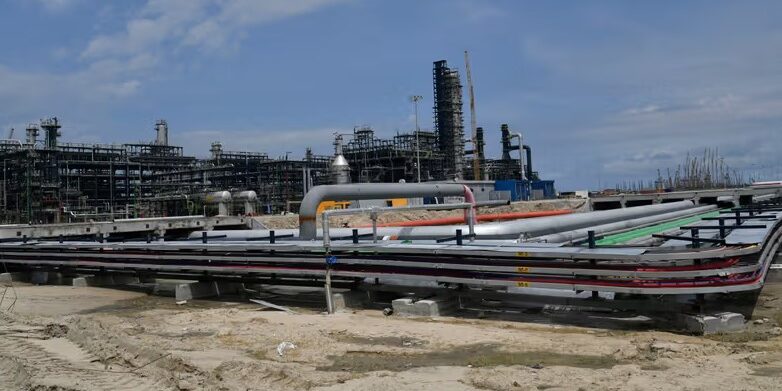In an effort to rejuvenate its ailing oil production infrastructure, Nigeria is partnering with South Korea to build several oil refineries across the country.
For decades, Nigeria has been heavily reliant on imported petroleum products, but the recent launch of the Dangote refinery marks a significant shift in the nation’s energy landscape.
A consortium of South Korean investors has finalized a deal with the Nigerian government to construct four refineries, according to The Punch.
Heineken Lokpobiri, Nigeria’s Minister of State for Petroleum Resources (Oil), announced the agreement during a summit organized by the Crude Oil Refineries Owners Association of Nigeria in Lagos.
Each of the planned refineries will have a minimum production capacity of 100,000 barrels per day. The minister highlighted Nigeria’s open-door policy for investors, encouraging them to invest in the country’s energy sector.
“We invite investors to build modular refineries by providing a supportive environment,” Lokpobiri stated. “A consortium from South Korea has been approved to establish four 100,000-barrel-capacity refineries at different locations across Nigeria.”
The Nigerian government has adopted a public-private partnership (PPP) model to stimulate investment in the midstream and downstream sectors of the oil and gas industry.
This approach aims to pave the way for more modular and large-scale refineries, securing Nigeria’s energy future.
The government has also opened opportunities for equity investment in these new facilities, signaling a strong commitment to energy security.
Lokpobiri further explained that the Nigerian Upstream Petroleum Regulatory Commission has developed transparent guidelines for domestic crude supply, ensuring local refineries have access to feedstock. Special concessions are also being extended to local refinery owners to support their operations.
Additionally, the ministry has introduced measures to mitigate the impact of downstream sector deregulation on the poor.
The government has streamlined access to tax breaks and exemptions for importing refinery equipment, a key part of Nigeria’s goal to become self-sufficient in petroleum production and establish itself as Africa’s refining hub.
Nigeria, once Africa’s largest oil producer, lacked domestic refining capacity until the Dangote refinery began operations.
Before September 2024, when Dangote started distributing Premium Motor Spirit (PMS), the country relied entirely on imported fuel.
In its first batch, the refinery supplied 103 million liters of gasoline to the Nigerian National Petroleum Corporation (NNPC), equivalent to 2,207 trucks of fuel.
According to a Bloomberg report, the Dangote refinery is preparing to process around 400,000 barrels of Nigerian crude daily in the coming months.
The 650,000-barrels-per-day refinery will receive 24 million barrels of local oil in October and November, reshaping Africa’s oil import and export markets.
Located in Lagos State on 2,635 hectares of land in the Ibeju Lekki area, the Dangote refinery was commissioned on May 22, 2023.
It is Africa’s largest refinery and the world’s biggest single-train facility, with a production capacity of 650,000 barrels per day.
Despite the success of the Dangote refinery, Nigeria’s state-owned refineries have struggled. In August 2023, the oil minister expressed hope that most of the country’s aging refineries, including the Port Harcourt facility, would be rehabilitated by the end of the year. However, these efforts have not yet materialized.
The Port Harcourt refinery is undergoing a $1.5 billion renovation by Italy’s Tecnimont, which was expected to be completed by 2021. As of April 2022, the oil ministry predicted that the restoration would take 44 months.
Other refineries, including the 110,000-barrel Kaduna plant and the Warri refinery, which once produced 125,000 barrels per day, remain in various stages of disrepair.
![]()




